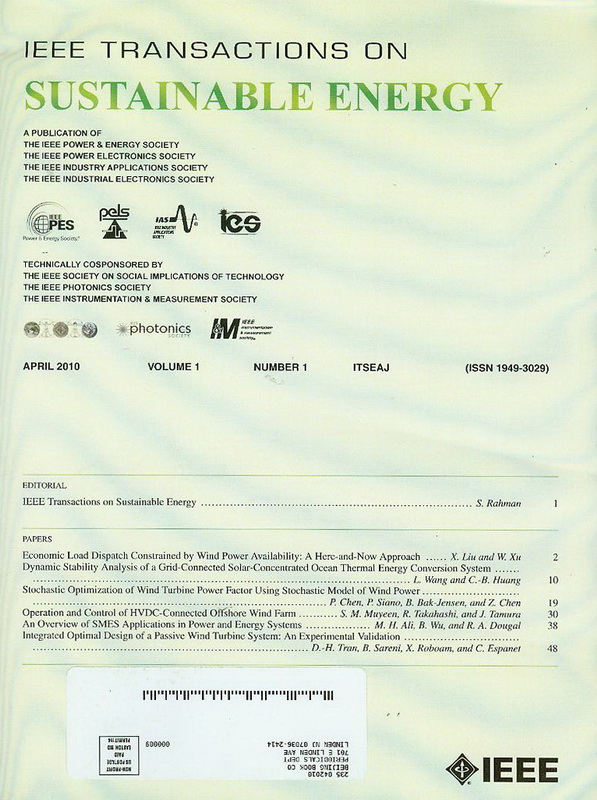Causal Mechanism-Enabled Zero-Label Learning for Power Generation Forecasting of Newly-Built PV Sites
IF 8.6
1区 工程技术
Q1 ENERGY & FUELS
引用次数: 0
Abstract
Power forecasting of newly built photovoltaic (PV) sites faces huge challenges owing to the lack of sufficient training samples. To this end, this paper proposes an unsupervised zero-label learning method for power generation forecasting of newly built PV sites without relying on any historical power output data. The main idea is to extract invariant causal structures across different PV sites and leverage this causality to enhance the power forecasting performance on the newly built ones. In particular, a causality-enabled domain adaptation network (CEDAN) is designed to capture the causal mechanism of PV generation from the multiple fine-grain segments of time-lagged data. It relaxes the causal relationships to an associative structure which is further concretized as attention score vectors through the designed intra- and inter-variable attention mechanisms. To quantify the distribution discrepancies between source and target domain causal structures, a specific domain adaptation loss function is designed for the optimization of CEDAN. It is further extended to a domain adaptation quantile loss to handle the uncertainties of PV power output. By jointly minimizing the domain adaptation loss and power forecasting error/conditional quantile loss, an invariant power generation causal mechanism across data domains for a newly built PV site can be learned. This allows the proposed method to achieve accurate and highly generalized power generation forecasting for newly built PV sites without relying on labeled data. Extensive experiments utilizing real PV generation data demonstrate that the proposed method surpasses state-of-the-art transfer learning methods by 7.57% at least in deterministic forecasting and 8.37% at least in probabilistic forecasting.基于因果机制的零标签学习用于新建光伏发电站的发电量预测
由于缺乏足够的训练样本,新建光伏电站的功率预测面临着巨大的挑战。为此,本文提出了一种不依赖任何历史发电量数据的无监督零标签学习方法,用于新建光伏电站的发电量预测。其主要思想是提取不同光伏站点之间的不变因果结构,并利用这种因果关系来提高新建站点的功率预测性能。特别是,设计了一个基于因果关系的领域自适应网络(CEDAN),以从多个细粒度的时滞数据中捕捉光伏发电的因果机制。它通过设计变量内和变量间的注意机制,将因果关系松弛为一个关联结构,并进一步具体化为注意得分向量。为了量化源域和目标域因果结构之间的分布差异,设计了特定的域自适应损失函数来优化CEDAN。进一步将其扩展为域自适应分位数损失来处理光伏发电输出的不确定性。通过联合最小化域适应损失和功率预测误差/条件分位数损失,可以了解新建光伏站点跨数据域的不变发电因果机制。这使得所提出的方法可以在不依赖标记数据的情况下实现对新建光伏电站的准确和高度一般化的发电量预测。利用真实光伏发电数据进行的大量实验表明,所提出的方法在确定性预测方面至少优于最先进的迁移学习方法7.57%,在概率预测方面至少优于8.37%。
本文章由计算机程序翻译,如有差异,请以英文原文为准。
求助全文
约1分钟内获得全文
求助全文
来源期刊

IEEE Transactions on Sustainable Energy
ENERGY & FUELS-ENGINEERING, ELECTRICAL & ELECTRONIC
CiteScore
21.40
自引率
5.70%
发文量
215
审稿时长
5 months
期刊介绍:
The IEEE Transactions on Sustainable Energy serves as a pivotal platform for sharing groundbreaking research findings on sustainable energy systems, with a focus on their seamless integration into power transmission and/or distribution grids. The journal showcases original research spanning the design, implementation, grid-integration, and control of sustainable energy technologies and systems. Additionally, the Transactions warmly welcomes manuscripts addressing the design, implementation, and evaluation of power systems influenced by sustainable energy systems and devices.
 求助内容:
求助内容: 应助结果提醒方式:
应助结果提醒方式:


